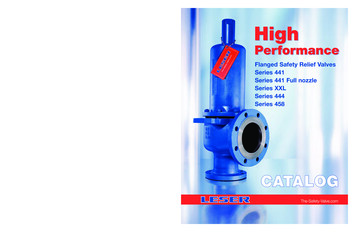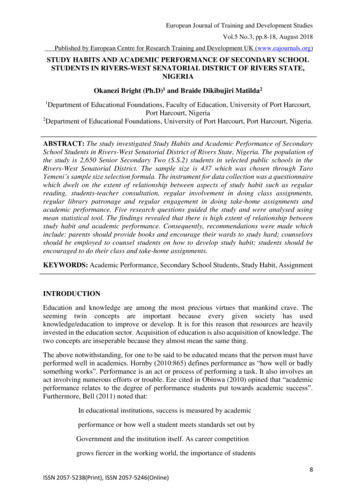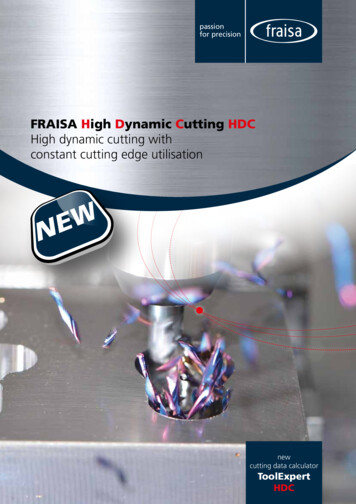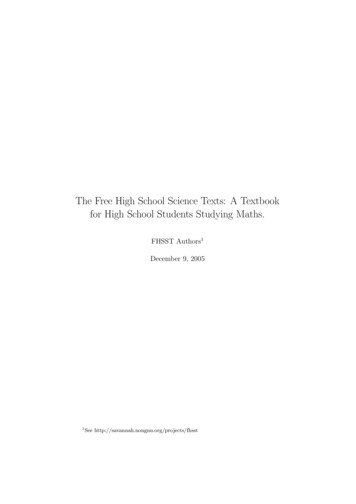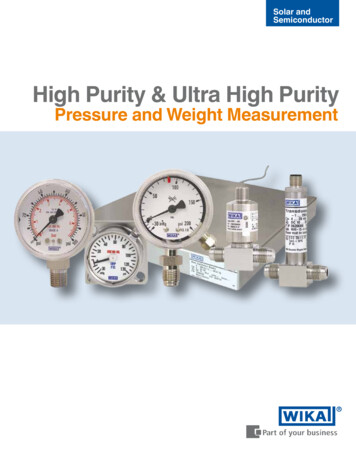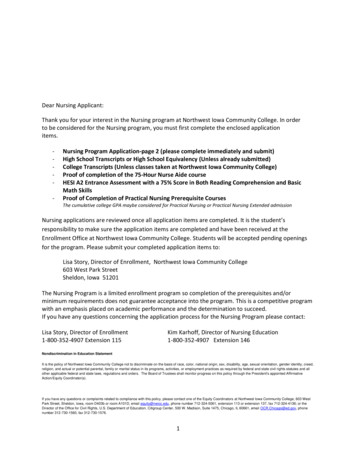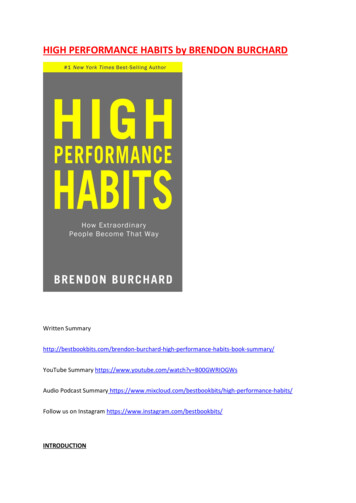
Transcription
HIGH PERFORMANCE HABITS by BRENDON BURCHARDWritten gh-performance-habits-book-summary/YouTube Summary https://www.youtube.com/watch?v B00GWRIOGWsAudio Podcast Summary ance-habits/Follow us on Instagram N
Excellence is an art won by training and habituation. We do not act rightly because we havevirtue or excellence, but rather have those because we have acted rightly. We are what werepeatedly do. Excellence, then, is not an act but a habit. (Aristotle)This book is about how people become extraordinary, and why others block themselves forpossibility.Achievers fight long and hard to succeed, propelling themselves forward by grit and hustle.And then, at some point they could never have anticipated, they plateau, lose passion, orburn out.With the right training and habits, anyone can become a high performer.High performers have systems built into their days that drive their success. Systems are whatseparate the pro from the novice.WHAT’S NOT WORKING Work hardBe passionateFocus on your strengthsPractice a lotStick to itBe gratefulLife is precious beyond words, and when you get a second chance – and every morning,every decision, can be that second chance – take a moment to define who you really are andwhat you really want.Live. Love. Matter. That is my mantra.With the right habits, anyone can dramatically increase results and become a high performerin almost any field of endeavour.High performance is not achieved by a specific kind of person, but rather by a specific set ofpractices, which I call high performance habits.Not all habits are created equal It turns out that there are bad, good, better, and best habits for realizing your full potentialin your life and career.Achievement is not your problem – alignment is.What’s achievable is not always what’s important.Certainty is the enemy of growth and high performance. Certainty ultimately blinds you, sets false or fixed limits, and creates “automatic” habits thatbecome predictable bad thinking and openings for your competitors to surpass you.High performers outgrow their youthful need for certainty and replace it with curiosity andgenuine self-confidence.What is High Performance? High performance refers to succeeding beyond standard norms, consistently over the longterm.High performers break the norms. They’re consistently exceeding the standard expectationsand results.
You simply can’t beat the norms if you’ve driven yourself into the ground. As it turns out,high performers’ sustained success is due in large part to their healthy approach to living.What we Know about High Performers High performers are more successful than their peers, yet they are less stressed.High performers love challenges and are more confident that they will achieve their goalsdespite adversity.High performers are healthier than their peers.High performers are happy.High performers are admired.High performers get better grades and reach higher positions of success.High performers work passionately regardless of traditional rewards.High performers are assertive (for the right reasons).High performers see and serve beyond their strengths.High performers are uniquely productive – they’ve mastered prolific quality output.High performers are adaptive servant leaders.Habits are created when we do something so many times that it becomes almost automatic.For example, after doing it a few times, it’s easy to tie your shoes, drive a car, type on akeyboard. You can now do those things without much thought. You’ve done them so manytimes, they became automatic routines.Deliberate habits. These must be consciously chosen, willed into existence, and continuallyrevisited to strengthen your character and increase your odds of success.Deliberate habits usually won’t come easily.When you knock on the door of opportunity do not be surprised that is Work who answers.Just as athletes never quit training, high performers never stop consciously conditioning andstrengthening their habits.To succeed, always remember that the main things is to keep the main thing the main thing.BEYOND NATURAL: THE QUEST FOR HIGH PERFORMANCE Don’t bother just to be better than your contemporaries or predecessors. Try to be betterthan yourself. (William Faulkner)Success in general, in almost any endeavour, is made possible by malleable factors – thingsyou can change and improve with effort. For example:The mindset you choose to adoptThe focus you give to your passions, and the persistence you pursue them withThe amount of practice you dedicate yourself toThe way you understand and treat othersThe discipline and constancy with which you strive for your goalsThe way you bounce back from lossesThe amount of physical exercise you do keep your brain and body fit and your overall wellbeing cared forSuccess is achieved not by a specific type of person but rather by people from all walks of lifewho enact a specific set of practices.FINDING WHAT MATTERS Motivation is what gets you started. Habit is what keeps you going. (Jim Rohn)
High performers do things differently from the way others do, and their practices can bereplicated across projects (and almost any situation) regardless of your personality, past, orpreferences.SIX HIGH PERFORMANCE HABITS, or HP6. 1. Seek clarity on who you want to be, how you want to interact with others, what you want,and what will bring you the greatest meaning.2. Generate energy so that you can maintain focus, effort, and wellbeing.3. Raise the necessity for exceptional performance. This means actively tapping into thereasons you absolutely must perform well.4. Increase productivity in your primary field of interest. Specifically, focus on prolific qualityoutput (PQO) in the area in which you want to be known and to drive impact.5. Develop influence with those around.6. Demonstrate courage by expressing your ideas, taking bold action, and standing up foryourself and others.Seek clarity. Generate energy. Raise necessity. Increase productivity. Develop Influence.Demonstrate Courage. These are the six habits that you need to adopt if you are to reachhigh performance in any situation.Effectiveness in life does not come from focusing on what is automatic, easy, or natural forus. Rather, it is the result of how we consciously strive to meet life’s harder challengers,grow beyond out comforts, and deliberately work to overcome our biases and preferences,so that we may understand, love, serve, and lead others.It’s about rising to serve a mission, not the mission bowing down to match limited strengths.If you have great ambitions to contribute extraordinary things, you’ll have to grow andstretch far beyond what’s natural to you. To rise to high performance, you’ll have to work on
the weaknesses, develop entirely new skill sets beyond what you find easy or what you “liketo do”.A RISING TIDE LIFTS ALL BOATS – ONE HABIT LIFTS ALL OTHERS We like to think of the HP6 as “meta-habits” because they make all other good habits in lifefall into place.Each improvement in any one area improves the others.Start with the end in mind. Start bringing your full attention to the moments of your life.Start bringing more joy. Start bringing more confidence. These things will not only makeyour feel better, they’ll also help you perform better.SECTION ONE: PERSONAL HABITSHIGH PERFORMANCE HABIT #1: SEEK CLARITY If you don’t have clarity of ideas, you’re just communicating sheer sound. (Yo-Yo Ma)CLARITY BASICS The essential habit of seeking clarity helps high performers keep engaged, growing, andfulfilled over the long haul.Compared with their peers, high performers have more clarity on who they are, what theywant, how to get it, and what they find meaningful and fulfilling.You generate your reality. In this same line of thinking, you don’t “have” clarity; yougenerate it.Clarity is the child of careful thought and mindful experimentation. It comes from askingyourself questions continually and further refining your perspective on life.Clarity research tells us that successful people know the answers to certain fundamentalquestions: Who am I? (What do I value? What are my strengths and weaknesses?) What aremy goals? What’s my plan?Self-awareness is so key to initial success. You have to know who you are, what you value,what your strengths and weaknesses are, and where you want to go. This kind of knowledgemakes you feel better about yourself and about life.You should also give yourself deadlines for your goals, or you won’t follow through. Studiesshow that having a specific plan attached to your goals – knowing when and where you willdo something – can more than double the likelihood of achieving a challenging goal.Highest performers had a great ability to focus on the future and define how they wouldachieve excellence. They didn’t just know who they were; indeed, they rarely focused ontheir present personality or preferences. Instead, they consistently thought about who theywanted to be and how to become that.PRACTICE ONE: ENVISION THE FUTURE FOUR High performers are clear on their intentions for themselves, their social world, their skills,and their service to others. I call these areas self, social, skills, and service, or the FutureFour.Simple things you can do: Be more intentional about who you want to become. Have visionbeyond your current circumstances. Imagine your best future self, and start acting like thatperson today.
What is apparent across all high performers is that they anticipate positive socialinteractions and they strive consciously and consistently to create them.High performers are also working on skills that focus on what I call their primary field ofinterest (PFI). If they love music, they laser in on what kind of music they want to learn, andthen study it. Their PFI is specific.High performers approach their learning not as generalists but as specialists.Look to the future. Identify key skills. Obsessively develop those skills.If you leave your growth to randomness, you’ll always live in the land of mediocrity.Clarifying your PFI and the skills you need to master for your next level of success must be apriority.How can I serve people with excellence and make an extraordinary contribution to theworld?PRACTICE TWO: DETERMINE THE FEELING YOU’RE AFTER The second practice that will help you heighten and sustain clarity in your life is to askyourself frequently, “What is the primary feeling I want to bring to this situation, and what isthe primary feeling I want to get from this situation?”My automatic emotions don’t have to be in charge. My feelings are my own.High performers are generating the feelings they want more often than taking the emotionsthat land on them.PRACTICE THREE: DEFINE WHAT’S MEANINGFUL High performers can do almost anything they set their heart and mind to. But not everymountain is worth the climb. What differentiates high performers from others is their criticaleye in figuring out what is going to be meaningful to their life experience. They spend moreof their time doing things that they find meaningful, and this makes them happy.High performers tended to equate four factors with meaning.First, they linked enthusiasm with meaning.The second link to meaning was connection.Third, high performers relate satisfaction with meaning.Passion Growth Contribution Personal SatisfactionThe fourth way that high performers say their efforts have meaning is by making them feelthat their life “makes sense.”Enthusiasm Connection Satisfaction Coherence MeaningYou need to bring more conscious and consistent thought to what you will find meaningfulin life.Focus on these things more consistently than you ever have before. That’s what moves theneedle. With greater focus will come greater clarity, and with greater clarity will come moreconsistent action and, ultimately, high performance.HIGH PERFORMANCE HABIT #2: GENERATE ENERGY It takes a lot of energy to succeed over the long haul. High performers have the magicaltrifecta of capital “E” Energy – that holistic kind that includes positive and enduring mental,physical, and emotional vibrancy. It’s the key to force that helps them perform better inmany areas of their life. It’s why high performers have so much more passion, stamina, andmotivation. If you can tap into the capital “E” Energy stored within, the world is yours.Low energy correlates with lower overall high performance scores.
Energy is also positively related to educational attainment, creativity, and assertiveness.The more energy someone has, the more likely they are to be happy and climb to the top oftheir primary field of interest.Stress is the ultimate energy and well-being killer.PRACTICE ONE: RELEASE TENSION, SET INTENTION The easiest fastest, and most effective way to help them increase their energy is to teachthem to master transitions.What do I mean by transitions? Well, every morning when you wake up and start your day,you experience a transition from rest to activation. The start of your day is a transition.Our days comprise a series of transitions.Release Tension, Set Intention.PRACTICE TWO: BRING THE JOY Bring more joy into your daily life.Positive emotion, in general, is one of the greatest predictors of the good life – high energyand high performance. People with more positive emotion have more satisfying marriages,make more money, and have better health.You’ve heard it said that showing up is 80 percent of success? Well, if you want to be a highperformer, show up and bring the joy.Only you are in charge of your enduring emotional experience.High performers will themselves into positive states. Just as athletes do specific things to getthemselves into “the zone,” high performers consciously cultivate joy.TRIGGERS TO SET UP The first trigger to
Excellence, then, is not an act but a habit. (Aristotle) This book is about how people become extraordinary, and why others block themselves for possibility. Achievers fight long and hard to succeed, propelling themselves forward by grit and hustle. And then, at some point they could never have anticipated, they plateau, lose passion, or burn out. With the right training and habits .
